Medical Malpractice Attorney Resume Examples

Jul 18, 2024
|
12 min read
Pinpointing Success: Crafting Your Medical Malpractice Attorney Resume for a Winning Case in the Job Market
Rated by 348 people
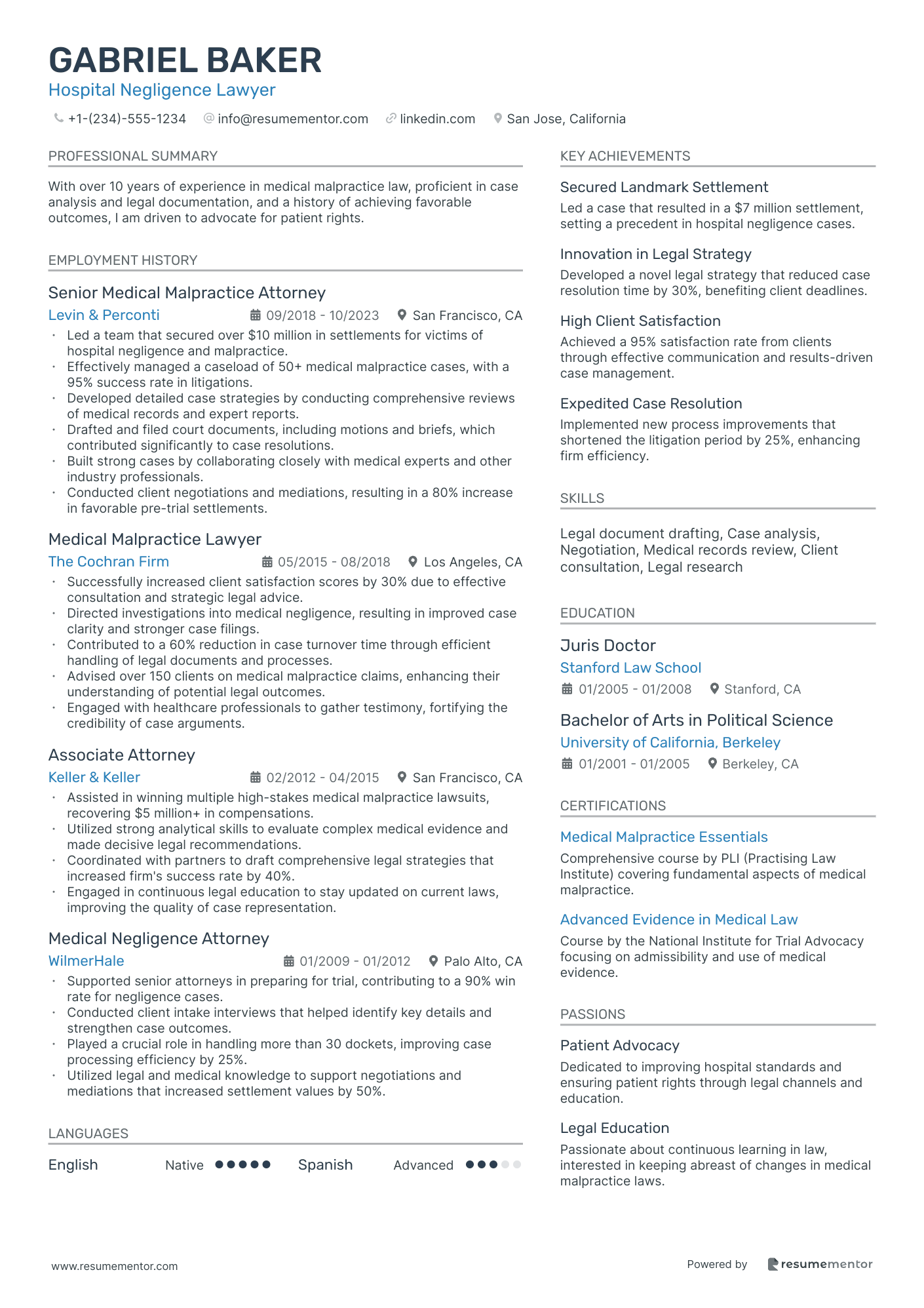
Hospital Negligence Lawyer
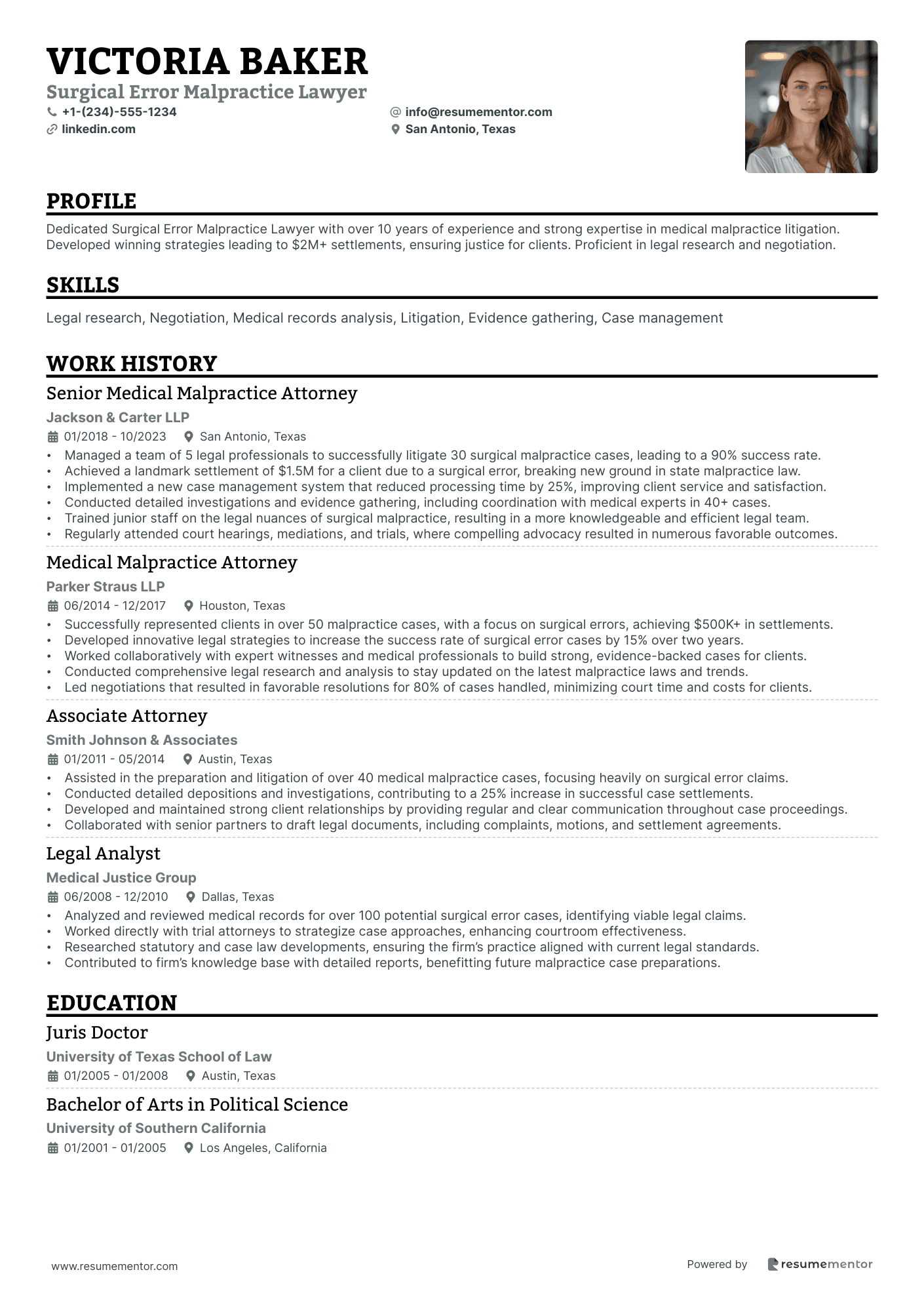
Surgical Error Malpractice Lawyer
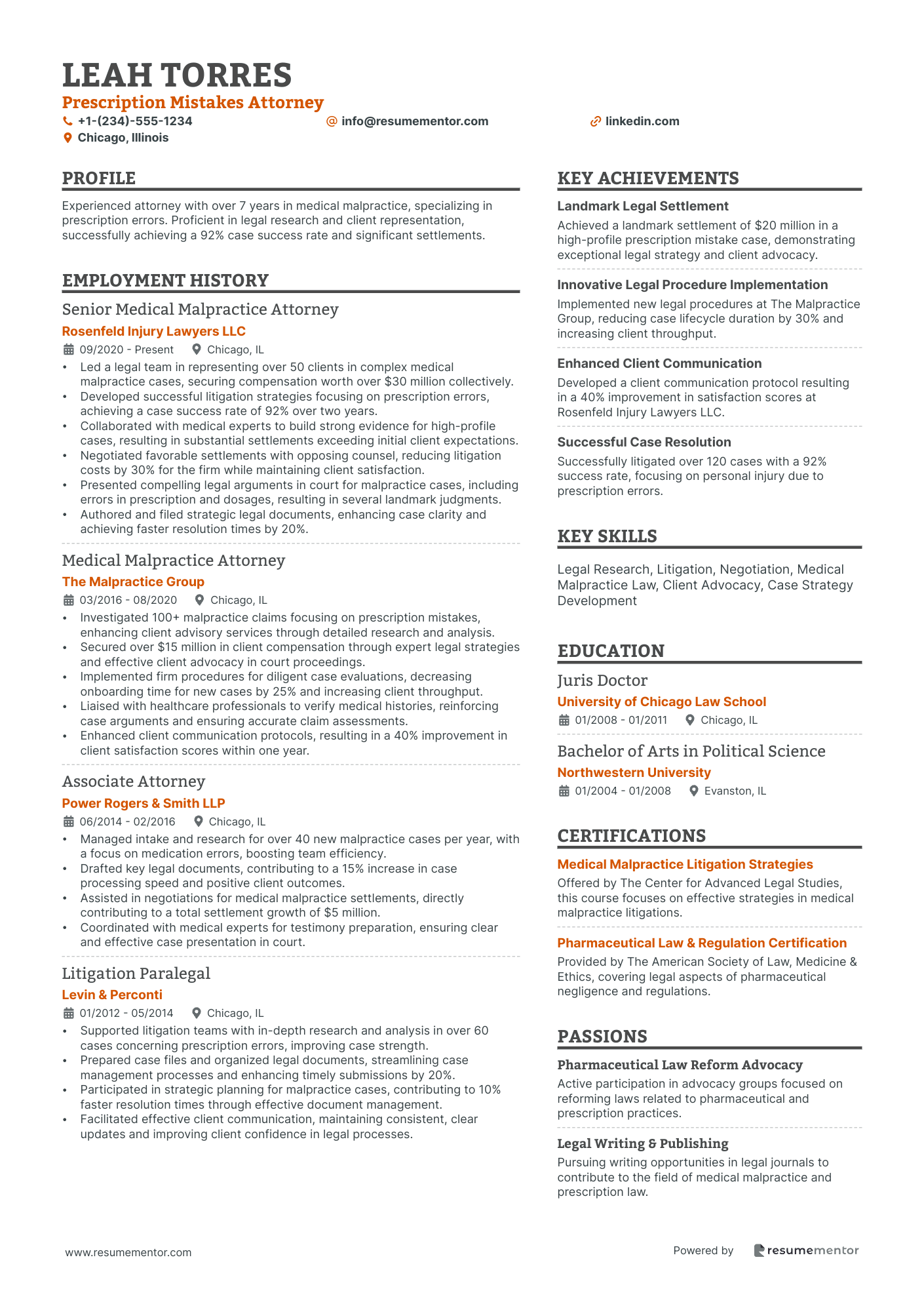
Prescription Mistakes Attorney
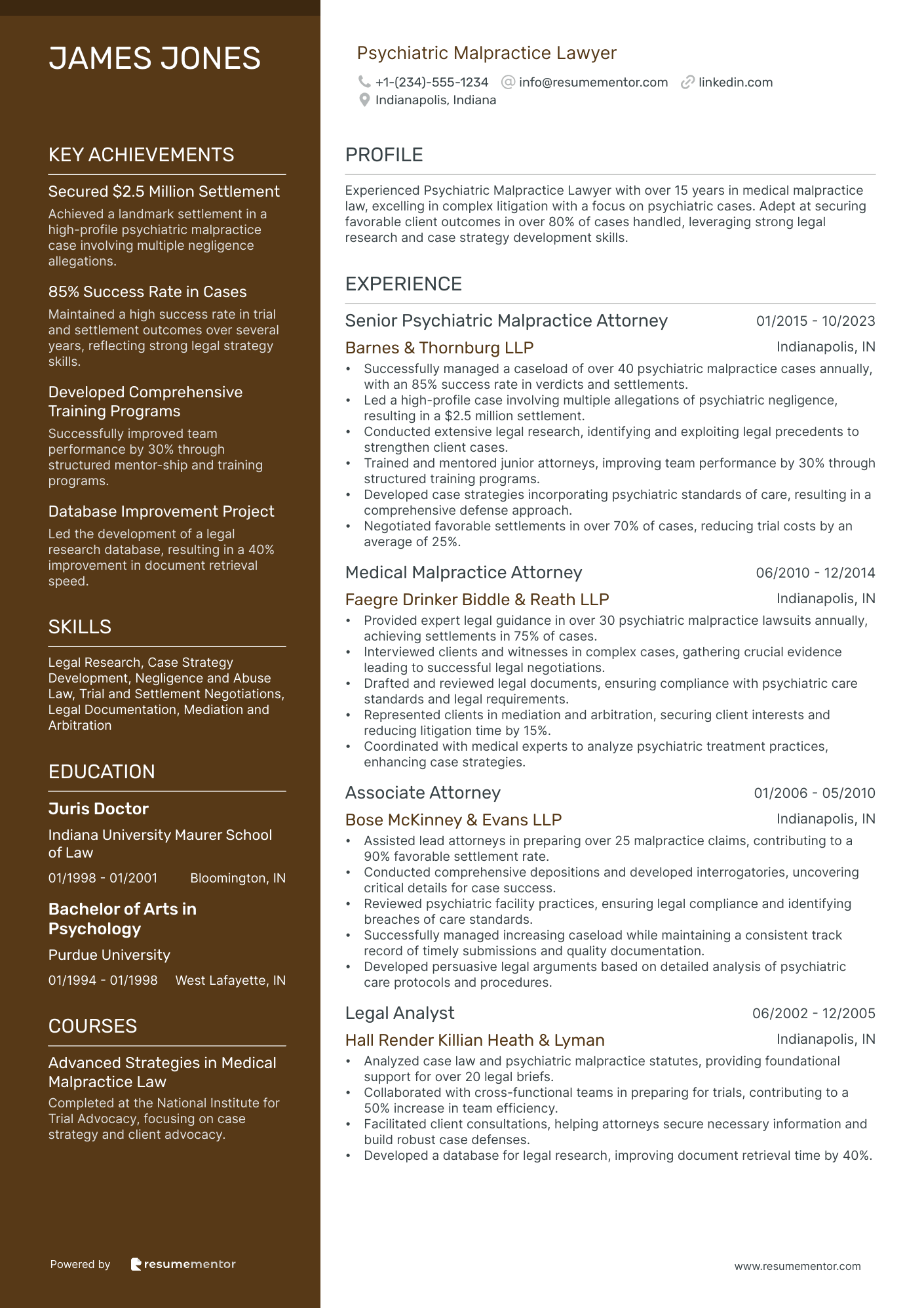
Psychiatric Malpractice Lawyer
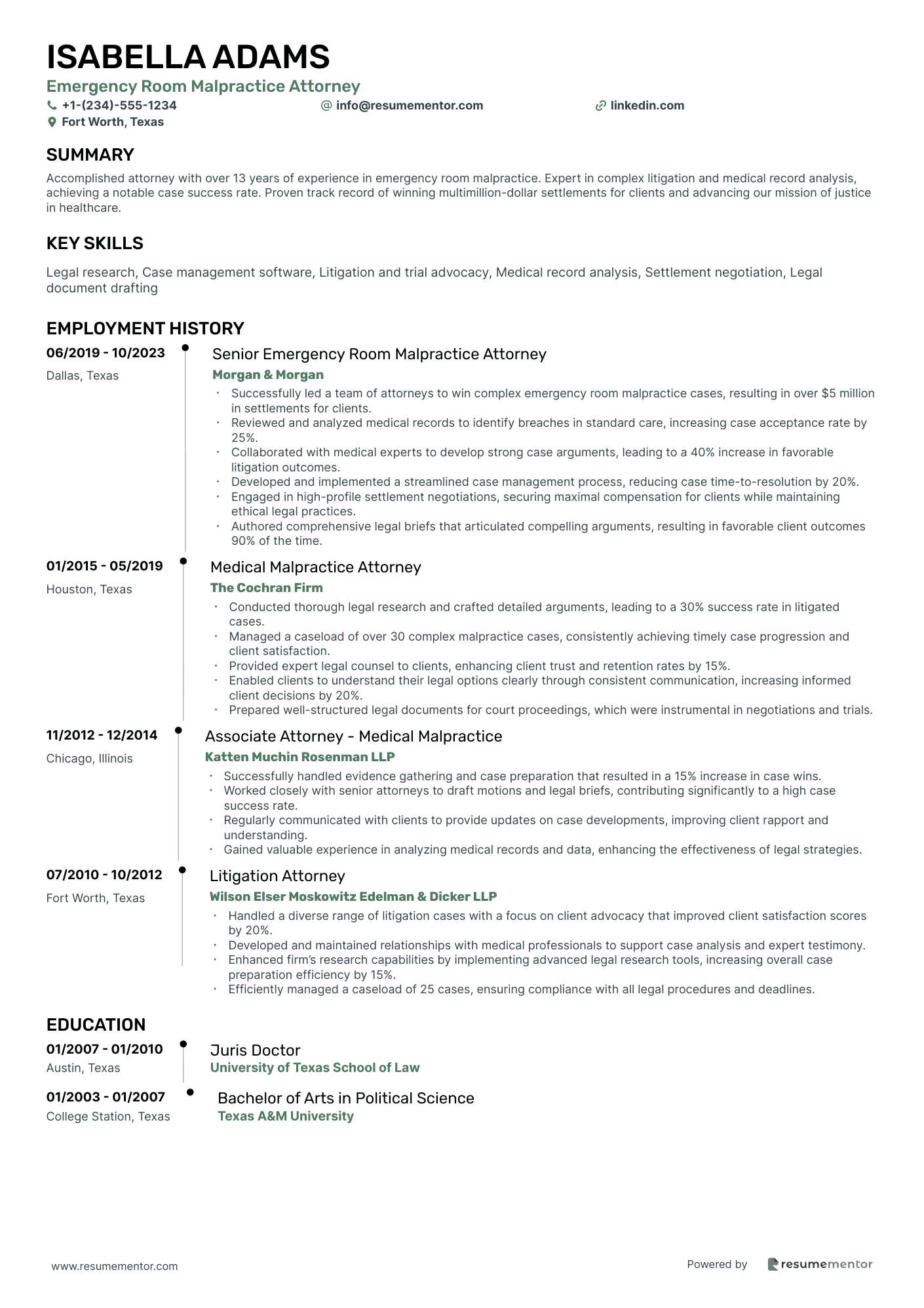
Emergency Room Malpractice Attorney
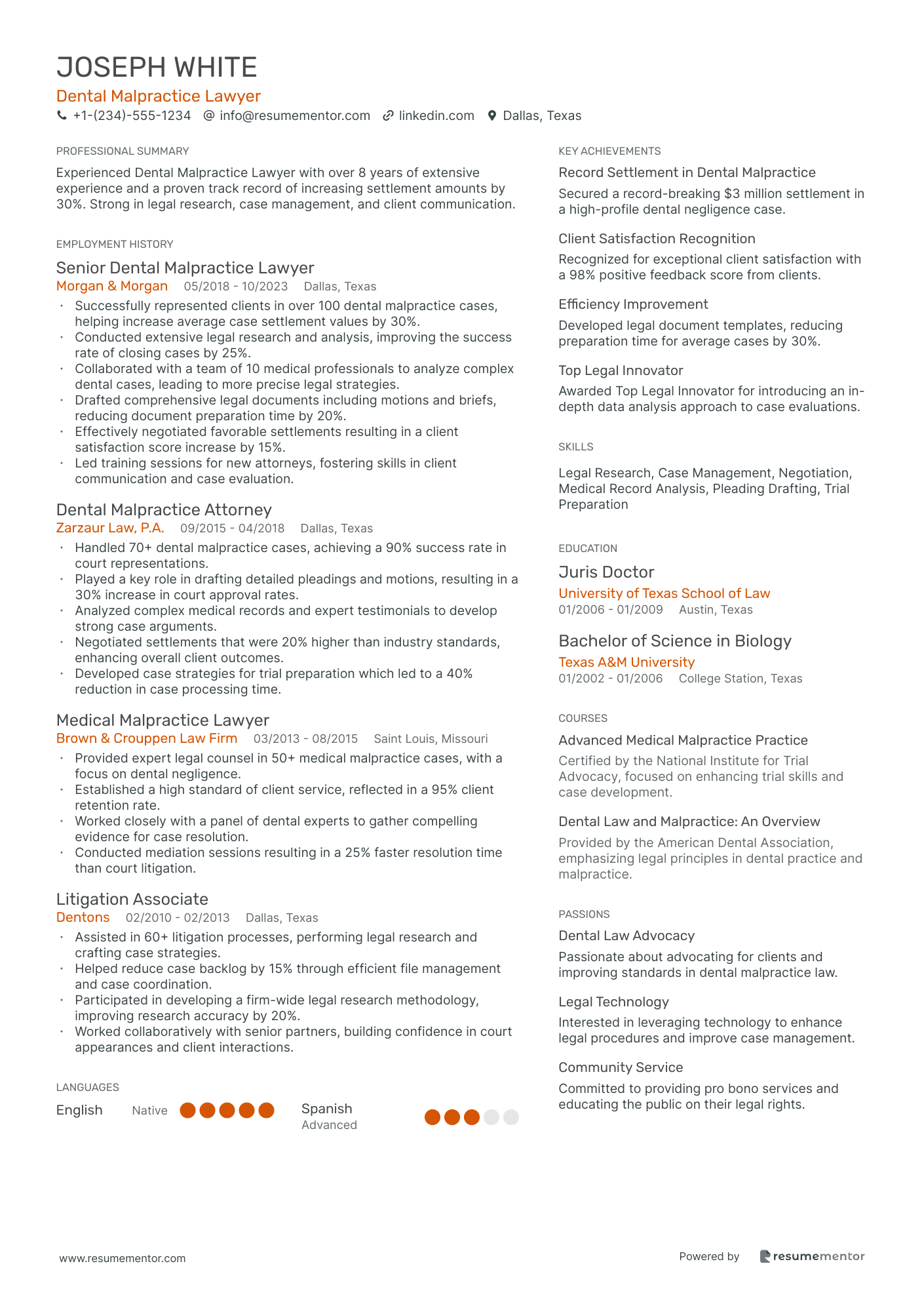
Dental Malpractice Lawyer
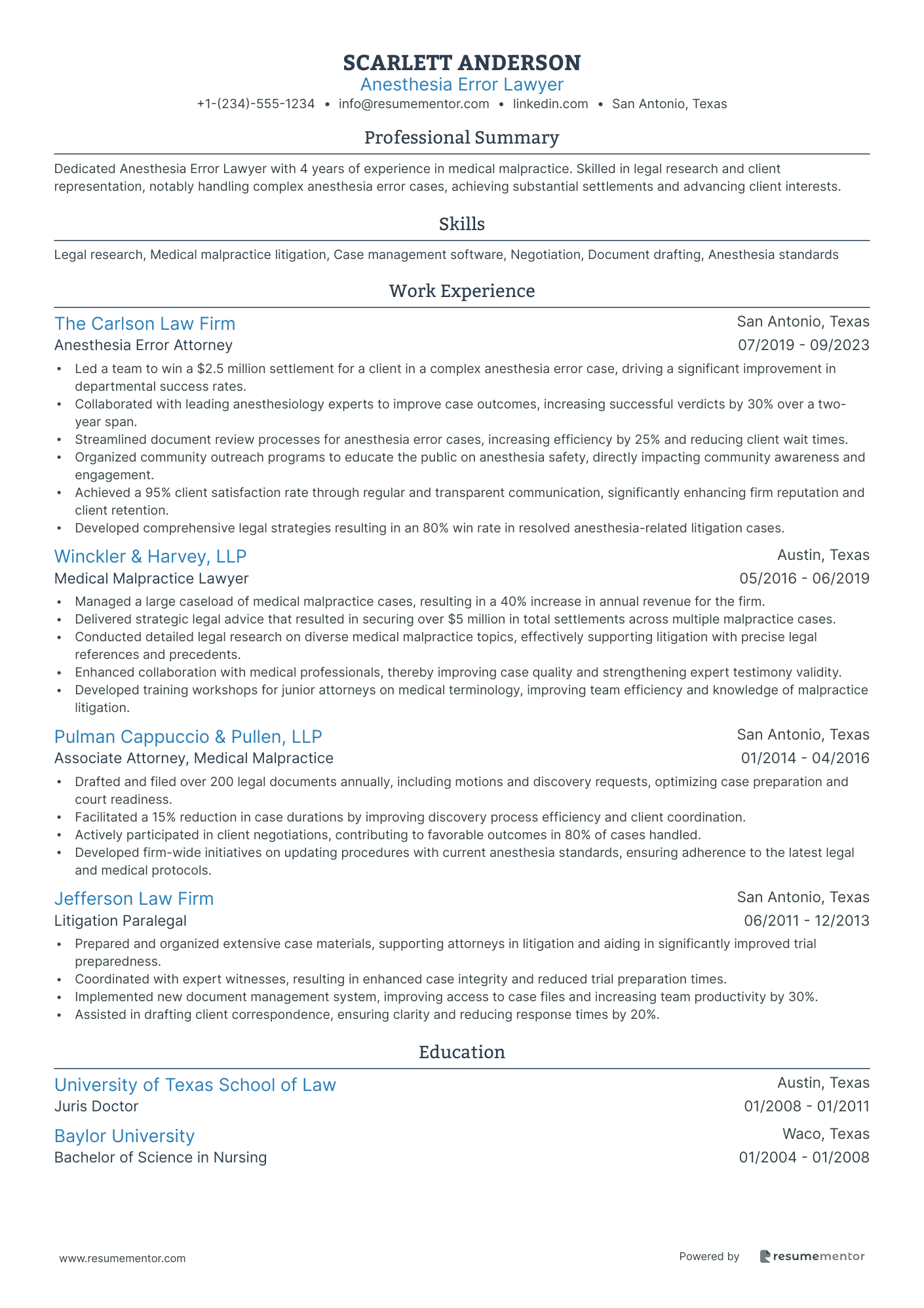
Anesthesia Error Lawyer
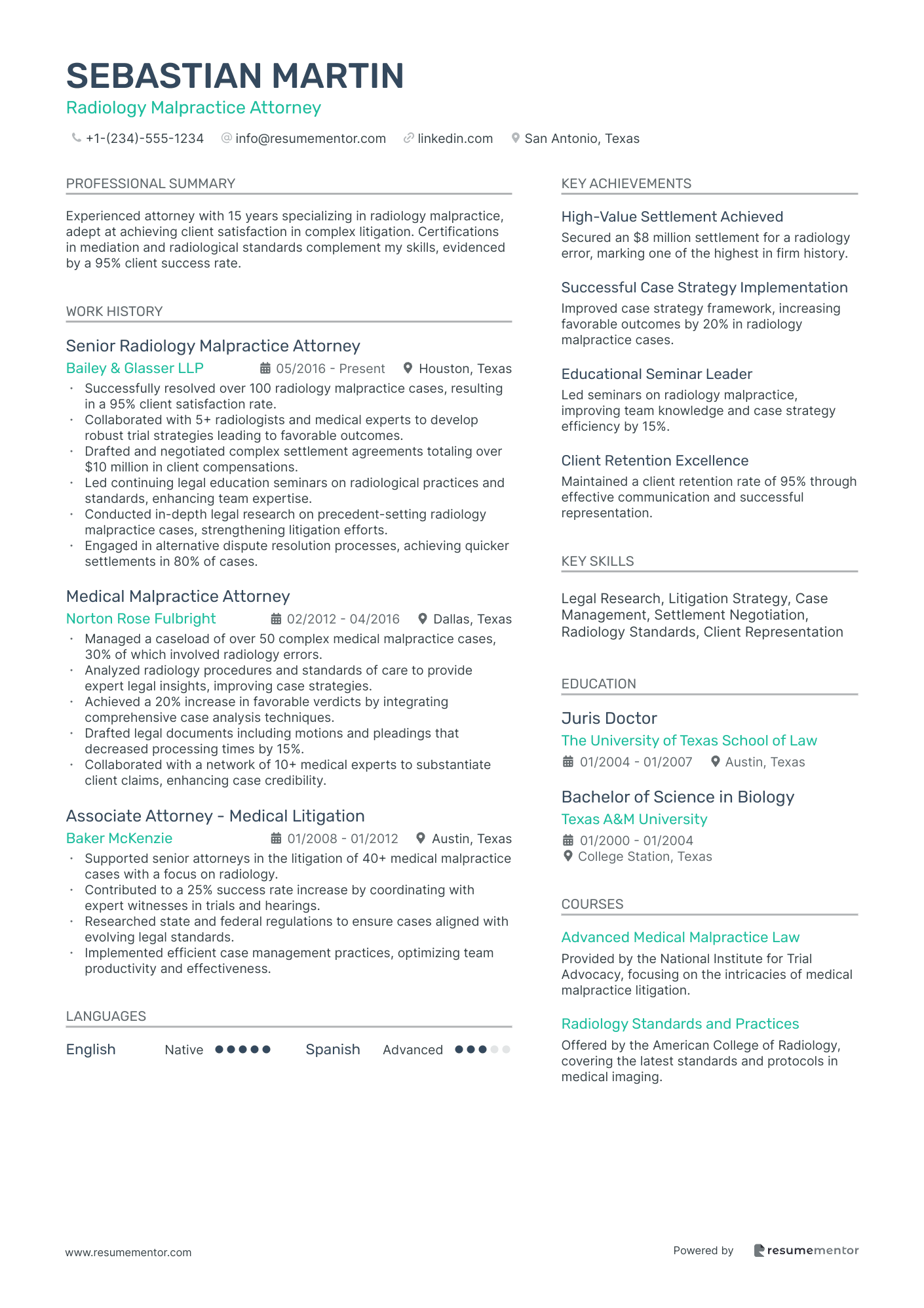
Radiology Malpractice Attorney
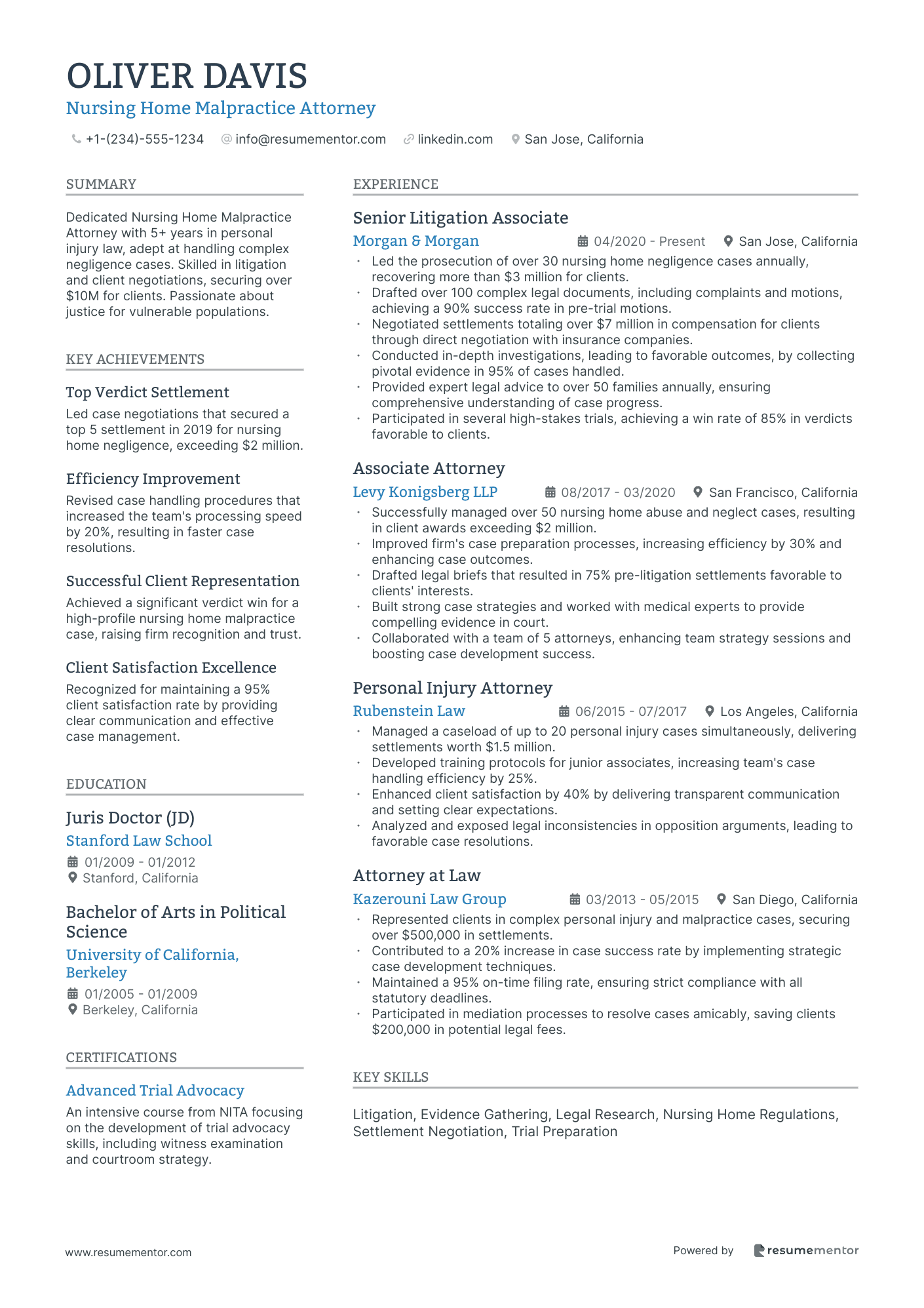
Nursing Home Malpractice Attorney

Hospital Negligence Lawyer resume sample
- •Led a team that secured over $10 million in settlements for victims of hospital negligence and malpractice.
- •Effectively managed a caseload of 50+ medical malpractice cases, with a 95% success rate in litigations.
- •Developed detailed case strategies by conducting comprehensive reviews of medical records and expert reports.
- •Drafted and filed court documents, including motions and briefs, which contributed significantly to case resolutions.
- •Built strong cases by collaborating closely with medical experts and other industry professionals.
- •Conducted client negotiations and mediations, resulting in a 80% increase in favorable pre-trial settlements.
- •Successfully increased client satisfaction scores by 30% due to effective consultation and strategic legal advice.
- •Directed investigations into medical negligence, resulting in improved case clarity and stronger case filings.
- •Contributed to a 60% reduction in case turnover time through efficient handling of legal documents and processes.
- •Advised over 150 clients on medical malpractice claims, enhancing their understanding of potential legal outcomes.
- •Engaged with healthcare professionals to gather testimony, fortifying the credibility of case arguments.
- •Assisted in winning multiple high-stakes medical malpractice lawsuits, recovering $5 million+ in compensations.
- •Utilized strong analytical skills to evaluate complex medical evidence and made decisive legal recommendations.
- •Coordinated with partners to draft comprehensive legal strategies that increased firm's success rate by 40%.
- •Engaged in continuous legal education to stay updated on current laws, improving the quality of case representation.
- •Supported senior attorneys in preparing for trial, contributing to a 90% win rate for negligence cases.
- •Conducted client intake interviews that helped identify key details and strengthen case outcomes.
- •Played a crucial role in handling more than 30 dockets, improving case processing efficiency by 25%.
- •Utilized legal and medical knowledge to support negotiations and mediations that increased settlement values by 50%.
Surgical Error Malpractice Lawyer resume sample
- •Managed a team of 5 legal professionals to successfully litigate 30 surgical malpractice cases, leading to a 90% success rate.
- •Achieved a landmark settlement of $1.5M for a client due to a surgical error, breaking new ground in state malpractice law.
- •Implemented a new case management system that reduced processing time by 25%, improving client service and satisfaction.
- •Conducted detailed investigations and evidence gathering, including coordination with medical experts in 40+ cases.
- •Trained junior staff on the legal nuances of surgical malpractice, resulting in a more knowledgeable and efficient legal team.
- •Regularly attended court hearings, mediations, and trials, where compelling advocacy resulted in numerous favorable outcomes.
- •Successfully represented clients in over 50 malpractice cases, with a focus on surgical errors, achieving $500K+ in settlements.
- •Developed innovative legal strategies to increase the success rate of surgical error cases by 15% over two years.
- •Worked collaboratively with expert witnesses and medical professionals to build strong, evidence-backed cases for clients.
- •Conducted comprehensive legal research and analysis to stay updated on the latest malpractice laws and trends.
- •Led negotiations that resulted in favorable resolutions for 80% of cases handled, minimizing court time and costs for clients.
- •Assisted in the preparation and litigation of over 40 medical malpractice cases, focusing heavily on surgical error claims.
- •Conducted detailed depositions and investigations, contributing to a 25% increase in successful case settlements.
- •Developed and maintained strong client relationships by providing regular and clear communication throughout case proceedings.
- •Collaborated with senior partners to draft legal documents, including complaints, motions, and settlement agreements.
- •Analyzed and reviewed medical records for over 100 potential surgical error cases, identifying viable legal claims.
- •Worked directly with trial attorneys to strategize case approaches, enhancing courtroom effectiveness.
- •Researched statutory and case law developments, ensuring the firm’s practice aligned with current legal standards.
- •Contributed to firm’s knowledge base with detailed reports, benefitting future malpractice case preparations.
Prescription Mistakes Attorney resume sample
- •Led a legal team in representing over 50 clients in complex medical malpractice cases, securing compensation worth over $30 million collectively.
- •Developed successful litigation strategies focusing on prescription errors, achieving a case success rate of 92% over two years.
- •Collaborated with medical experts to build strong evidence for high-profile cases, resulting in substantial settlements exceeding initial client expectations.
- •Negotiated favorable settlements with opposing counsel, reducing litigation costs by 30% for the firm while maintaining client satisfaction.
- •Presented compelling legal arguments in court for malpractice cases, including errors in prescription and dosages, resulting in several landmark judgments.
- •Authored and filed strategic legal documents, enhancing case clarity and achieving faster resolution times by 20%.
- •Investigated 100+ malpractice claims focusing on prescription mistakes, enhancing client advisory services through detailed research and analysis.
- •Secured over $15 million in client compensation through expert legal strategies and effective client advocacy in court proceedings.
- •Implemented firm procedures for diligent case evaluations, decreasing onboarding time for new cases by 25% and increasing client throughput.
- •Liaised with healthcare professionals to verify medical histories, reinforcing case arguments and ensuring accurate claim assessments.
- •Enhanced client communication protocols, resulting in a 40% improvement in client satisfaction scores within one year.
- •Managed intake and research for over 40 new malpractice cases per year, with a focus on medication errors, boosting team efficiency.
- •Drafted key legal documents, contributing to a 15% increase in case processing speed and positive client outcomes.
- •Assisted in negotiations for medical malpractice settlements, directly contributing to a total settlement growth of $5 million.
- •Coordinated with medical experts for testimony preparation, ensuring clear and effective case presentation in court.
- •Supported litigation teams with in-depth research and analysis in over 60 cases concerning prescription errors, improving case strength.
- •Prepared case files and organized legal documents, streamlining case management processes and enhancing timely submissions by 20%.
- •Participated in strategic planning for malpractice cases, contributing to 10% faster resolution times through effective document management.
- •Facilitated effective client communication, maintaining consistent, clear updates and improving client confidence in legal processes.
Psychiatric Malpractice Lawyer resume sample
- •Successfully managed a caseload of over 40 psychiatric malpractice cases annually, with an 85% success rate in verdicts and settlements.
- •Led a high-profile case involving multiple allegations of psychiatric negligence, resulting in a $2.5 million settlement.
- •Conducted extensive legal research, identifying and exploiting legal precedents to strengthen client cases.
- •Trained and mentored junior attorneys, improving team performance by 30% through structured training programs.
- •Developed case strategies incorporating psychiatric standards of care, resulting in a comprehensive defense approach.
- •Negotiated favorable settlements in over 70% of cases, reducing trial costs by an average of 25%.
- •Provided expert legal guidance in over 30 psychiatric malpractice lawsuits annually, achieving settlements in 75% of cases.
- •Interviewed clients and witnesses in complex cases, gathering crucial evidence leading to successful legal negotiations.
- •Drafted and reviewed legal documents, ensuring compliance with psychiatric care standards and legal requirements.
- •Represented clients in mediation and arbitration, securing client interests and reducing litigation time by 15%.
- •Coordinated with medical experts to analyze psychiatric treatment practices, enhancing case strategies.
- •Assisted lead attorneys in preparing over 25 malpractice claims, contributing to a 90% favorable settlement rate.
- •Conducted comprehensive depositions and developed interrogatories, uncovering critical details for case success.
- •Reviewed psychiatric facility practices, ensuring legal compliance and identifying breaches of care standards.
- •Successfully managed increasing caseload while maintaining a consistent track record of timely submissions and quality documentation.
- •Developed persuasive legal arguments based on detailed analysis of psychiatric care protocols and procedures.
- •Analyzed case law and psychiatric malpractice statutes, providing foundational support for over 20 legal briefs.
- •Collaborated with cross-functional teams in preparing for trials, contributing to a 50% increase in team efficiency.
- •Facilitated client consultations, helping attorneys secure necessary information and build robust case defenses.
- •Developed a database for legal research, improving document retrieval time by 40%.
Emergency Room Malpractice Attorney resume sample
- •Successfully led a team of attorneys to win complex emergency room malpractice cases, resulting in over $5 million in settlements for clients.
- •Reviewed and analyzed medical records to identify breaches in standard care, increasing case acceptance rate by 25%.
- •Collaborated with medical experts to develop strong case arguments, leading to a 40% increase in favorable litigation outcomes.
- •Developed and implemented a streamlined case management process, reducing case time-to-resolution by 20%.
- •Engaged in high-profile settlement negotiations, securing maximal compensation for clients while maintaining ethical legal practices.
- •Authored comprehensive legal briefs that articulated compelling arguments, resulting in favorable client outcomes 90% of the time.
- •Conducted thorough legal research and crafted detailed arguments, leading to a 30% success rate in litigated cases.
- •Managed a caseload of over 30 complex malpractice cases, consistently achieving timely case progression and client satisfaction.
- •Provided expert legal counsel to clients, enhancing client trust and retention rates by 15%.
- •Enabled clients to understand their legal options clearly through consistent communication, increasing informed client decisions by 20%.
- •Prepared well-structured legal documents for court proceedings, which were instrumental in negotiations and trials.
- •Successfully handled evidence gathering and case preparation that resulted in a 15% increase in case wins.
- •Worked closely with senior attorneys to draft motions and legal briefs, contributing significantly to a high case success rate.
- •Regularly communicated with clients to provide updates on case developments, improving client rapport and understanding.
- •Gained valuable experience in analyzing medical records and data, enhancing the effectiveness of legal strategies.
- •Handled a diverse range of litigation cases with a focus on client advocacy that improved client satisfaction scores by 20%.
- •Developed and maintained relationships with medical professionals to support case analysis and expert testimony.
- •Enhanced firm’s research capabilities by implementing advanced legal research tools, increasing overall case preparation efficiency by 15%.
- •Efficiently managed a caseload of 25 cases, ensuring compliance with all legal procedures and deadlines.
Dental Malpractice Lawyer resume sample
- •Successfully represented clients in over 100 dental malpractice cases, helping increase average case settlement values by 30%.
- •Conducted extensive legal research and analysis, improving the success rate of closing cases by 25%.
- •Collaborated with a team of 10 medical professionals to analyze complex dental cases, leading to more precise legal strategies.
- •Drafted comprehensive legal documents including motions and briefs, reducing document preparation time by 20%.
- •Effectively negotiated favorable settlements resulting in a client satisfaction score increase by 15%.
- •Led training sessions for new attorneys, fostering skills in client communication and case evaluation.
- •Handled 70+ dental malpractice cases, achieving a 90% success rate in court representations.
- •Played a key role in drafting detailed pleadings and motions, resulting in a 30% increase in court approval rates.
- •Analyzed complex medical records and expert testimonials to develop strong case arguments.
- •Negotiated settlements that were 20% higher than industry standards, enhancing overall client outcomes.
- •Developed case strategies for trial preparation which led to a 40% reduction in case processing time.
- •Provided expert legal counsel in 50+ medical malpractice cases, with a focus on dental negligence.
- •Established a high standard of client service, reflected in a 95% client retention rate.
- •Worked closely with a panel of dental experts to gather compelling evidence for case resolution.
- •Conducted mediation sessions resulting in a 25% faster resolution time than court litigation.
- •Assisted in 60+ litigation processes, performing legal research and crafting case strategies.
- •Helped reduce case backlog by 15% through efficient file management and case coordination.
- •Participated in developing a firm-wide legal research methodology, improving research accuracy by 20%.
- •Worked collaboratively with senior partners, building confidence in court appearances and client interactions.
Anesthesia Error Lawyer resume sample
- •Led a team to win a $2.5 million settlement for a client in a complex anesthesia error case, driving a significant improvement in departmental success rates.
- •Collaborated with leading anesthesiology experts to improve case outcomes, increasing successful verdicts by 30% over a two-year span.
- •Streamlined document review processes for anesthesia error cases, increasing efficiency by 25% and reducing client wait times.
- •Organized community outreach programs to educate the public on anesthesia safety, directly impacting community awareness and engagement.
- •Achieved a 95% client satisfaction rate through regular and transparent communication, significantly enhancing firm reputation and client retention.
- •Developed comprehensive legal strategies resulting in an 80% win rate in resolved anesthesia-related litigation cases.
- •Managed a large caseload of medical malpractice cases, resulting in a 40% increase in annual revenue for the firm.
- •Delivered strategic legal advice that resulted in securing over $5 million in total settlements across multiple malpractice cases.
- •Conducted detailed legal research on diverse medical malpractice topics, effectively supporting litigation with precise legal references and precedents.
- •Enhanced collaboration with medical professionals, thereby improving case quality and strengthening expert testimony validity.
- •Developed training workshops for junior attorneys on medical terminology, improving team efficiency and knowledge of malpractice litigation.
- •Drafted and filed over 200 legal documents annually, including motions and discovery requests, optimizing case preparation and court readiness.
- •Facilitated a 15% reduction in case durations by improving discovery process efficiency and client coordination.
- •Actively participated in client negotiations, contributing to favorable outcomes in 80% of cases handled.
- •Developed firm-wide initiatives on updating procedures with current anesthesia standards, ensuring adherence to the latest legal and medical protocols.
- •Prepared and organized extensive case materials, supporting attorneys in litigation and aiding in significantly improved trial preparedness.
- •Coordinated with expert witnesses, resulting in enhanced case integrity and reduced trial preparation times.
- •Implemented new document management system, improving access to case files and increasing team productivity by 30%.
- •Assisted in drafting client correspondence, ensuring clarity and reducing response times by 20%.
Radiology Malpractice Attorney resume sample
- •Successfully resolved over 100 radiology malpractice cases, resulting in a 95% client satisfaction rate.
- •Collaborated with 5+ radiologists and medical experts to develop robust trial strategies leading to favorable outcomes.
- •Drafted and negotiated complex settlement agreements totaling over $10 million in client compensations.
- •Led continuing legal education seminars on radiological practices and standards, enhancing team expertise.
- •Conducted in-depth legal research on precedent-setting radiology malpractice cases, strengthening litigation efforts.
- •Engaged in alternative dispute resolution processes, achieving quicker settlements in 80% of cases.
- •Managed a caseload of over 50 complex medical malpractice cases, 30% of which involved radiology errors.
- •Analyzed radiology procedures and standards of care to provide expert legal insights, improving case strategies.
- •Achieved a 20% increase in favorable verdicts by integrating comprehensive case analysis techniques.
- •Drafted legal documents including motions and pleadings that decreased processing times by 15%.
- •Collaborated with a network of 10+ medical experts to substantiate client claims, enhancing case credibility.
- •Supported senior attorneys in the litigation of 40+ medical malpractice cases with a focus on radiology.
- •Contributed to a 25% success rate increase by coordinating with expert witnesses in trials and hearings.
- •Researched state and federal regulations to ensure cases aligned with evolving legal standards.
- •Implemented efficient case management practices, optimizing team productivity and effectiveness.
Nursing Home Malpractice Attorney resume sample
- •Led the prosecution of over 30 nursing home negligence cases annually, recovering more than $3 million for clients.
- •Drafted over 100 complex legal documents, including complaints and motions, achieving a 90% success rate in pre-trial motions.
- •Negotiated settlements totaling over $7 million in compensation for clients through direct negotiation with insurance companies.
- •Conducted in-depth investigations, leading to favorable outcomes, by collecting pivotal evidence in 95% of cases handled.
- •Provided expert legal advice to over 50 families annually, ensuring comprehensive understanding of case progress.
- •Participated in several high-stakes trials, achieving a win rate of 85% in verdicts favorable to clients.
- •Successfully managed over 50 nursing home abuse and neglect cases, resulting in client awards exceeding $2 million.
- •Improved firm's case preparation processes, increasing efficiency by 30% and enhancing case outcomes.
- •Drafted legal briefs that resulted in 75% pre-litigation settlements favorable to clients' interests.
- •Built strong case strategies and worked with medical experts to provide compelling evidence in court.
- •Collaborated with a team of 5 attorneys, enhancing team strategy sessions and boosting case development success.
- •Managed a caseload of up to 20 personal injury cases simultaneously, delivering settlements worth $1.5 million.
- •Developed training protocols for junior associates, increasing team's case handling efficiency by 25%.
- •Enhanced client satisfaction by 40% by delivering transparent communication and setting clear expectations.
- •Analyzed and exposed legal inconsistencies in opposition arguments, leading to favorable case resolutions.
- •Represented clients in complex personal injury and malpractice cases, securing over $500,000 in settlements.
- •Contributed to a 20% increase in case success rate by implementing strategic case development techniques.
- •Maintained a 95% on-time filing rate, ensuring strict compliance with all statutory deadlines.
- •Participated in mediation processes to resolve cases amicably, saving clients $200,000 in potential legal fees.
As a medical malpractice attorney, your career is like a courtroom thriller, where every detail counts and the stakes are high. While you excel at unraveling complex medical cases and advocating for justice, effectively presenting your qualifications through a resume can be challenging. It’s tough to convey your legal acumen and medical insights concisely in such a competitive field.
To make your resume stand out, it's important to seamlessly integrate your legal achievements with your understanding of medical intricacies. This demonstrates your courtroom prowess along with your deep knowledge of healthcare laws. Employers are interested in your ability to navigate complex medical cases and secure victories, which is why using a well-structured resume template can greatly assist you. A template provides a professional layout, helping you focus on crafting content that highlights your unique strengths.
By using a resume template, you streamline the process of creating a compelling career narrative. This allows you to focus on detailing your legal milestones and medical case wins. If you're ready to craft a resume that captures attention and opens doors to interviews, starting with an effective template is key: explore these resume templates.
With this guide, you'll be equipped to draft a resume that truly highlights your expertise and accomplishments, making your experience shine.
Key Takeaways
- When writing a resume as a medical malpractice attorney, convey your legal acumen and medical insights in a concise manner to stand out in a competitive field.
- Key elements of your resume should include contact information, a professional summary showcasing legal expertise and achievements, detailed experience in medical malpractice law, education credentials, and relevant licenses or certifications.
- Choosing the right resume format, such as chronological, ensures your professional growth is evident to potential employers, and using modern, clear fonts enhances the document’s visual appeal.
- Highlight both hard skills like legal research, negotiation, and medical knowledge, and soft skills such as communication, problem-solving, and leadership, to present a well-rounded profile.
- Including extra sections like language skills, volunteer work, or interests enriches your resume, providing a holistic perspective of your personality and professional dedication.
What to focus on when writing your medical malpractice attorney resume
Your medical malpractice attorney resume should give the recruiter a clear picture of your expertise in handling complex legal cases involving healthcare. It needs to highlight your skills in managing medical claims and demonstrate your understanding of healthcare regulations, alongside your ability to advocate for clients. Presenting your experience and qualifications effectively means focusing on analytical skills, sharp communication abilities, and legal expertise specific to medical malpractice.
How to structure your medical malpractice attorney resume
- Contact Information—Start with your full name, phone number, email address, and LinkedIn profile. These details must be current and maintain a professional tone, as first impressions count. A polished contact section sets the stage for the rest of your resume.
- Professional Summary—Develop a compelling statement that showcases your key strengths, such as legal expertise and specific experiences in medical malpractice cases. Include significant outcomes or landmark cases you’ve successfully navigated, as they can quickly grab the recruiter's attention. This summary is your resume's opening pitch, and it should efficiently encapsulate why you're the right fit for the role.
- Experience—For each role, detail your responsibilities linked to medical malpractice law. Utilize bullet points for clarity and emphasis, and don't forget to include the firm's name, your position, and your tenure there. Highlight cases or settlements that stand out to demonstrate your ability to handle challenging and notable cases successfully.
- Education—Clearly list your law degree and where you studied, noting the graduation date. Any honors or distinctions are worth mentioning as they underscore your academic achievements and commitment to excellence—this background forms the foundation of your legal expertise.
- Licenses and Certifications—Outline bar admissions and any certifications relevant to your specialization. Include specialized training in healthcare law, demonstrating your niche expertise and dedication to mastering the field. Certifications strengthen your qualifications and bolster your credibility in medical malpractice law.
- Skills—This section should spotlight your abilities in areas like legal research, client consultation, and negotiation. Emphasize your proficiency in interpreting medical records and collaborating with medical experts. These skills are essential to effectively argue cases and advocate for clients, making this part of your resume particularly crucial.
In addition to these sections, we'll cover optional elements such as Awards, Professional Affiliations, or Volunteer Experience, to give your resume added depth and highlight your dedication to the legal field. Next, we’ll explore each resume section more in-depth, offering insights on how to create a resume format that conveys professionalism and expertise.
Which resume format to choose
Choosing the right resume format is crucial for writing a compelling medical malpractice attorney resume. A chronological format is particularly effective as it clearly outlines your professional growth and experience. This approach makes it easy for employers to follow your career path, highlighting key roles and responsibilities that demonstrate your expertise in the legal field.
When thinking about the visual appeal, modern and professional fonts like Raleway, Montserrat, or Lato are excellent choices. These fonts provide a contemporary look while ensuring clarity and readability. A clean typeface can subtly communicate attention to detail and professionalism, making your resume stand out in a stack of applications.
Always save your resume as a PDF. This file format is dependable because it locks in your layout and design. PDFs provide continuity and ensure that your resume maintains its polished appearance across different screens and operating systems. This is essential in delivering a strong first impression without any technical hiccups.
Lastly, the structure of your resume is as important as its content. Keep your margins at one inch all around to give your document a balanced and organized look. Adequate spacing prevents your resume from feeling cramped, making it easier for recruiters to focus on the content.
In combining these elements—using a chronological format, selecting modern fonts, saving as a PDF, and maintaining one-inch margins—you achieve a professional and effective presentation that highlights your skills and experience as a medical malpractice attorney.
How to write a quantifiable resume experience section
Crafting the experience section of your medical malpractice attorney resume is crucial for making a strong impression. This section is your opportunity to highlight your professional journey by focusing on achievements and expertise that matter most to potential employers. Start by structuring this section in reverse chronological order, emphasizing your most recent and relevant roles. This organization helps employers see your career progression and focus on your current capabilities. Covering at least 10-15 years of experience is ideal, ensuring you include significant responsibilities or specializations within medical malpractice law.
Tailoring is key to making your resume stand out. Align your experiences with the skills and qualifications the job ad mentions, clearly demonstrating why you’re the right fit. Use action words like “achieved,” “led,” “won,” and “negotiated” to effectively highlight your accomplishments. Here’s what a compelling experience section might look like:
- •Successfully defended over 80% of cases, resulting in favorable outcomes for clients.
- •Negotiated settlements totaling $10 million, reducing client liabilities by 30%.
- •Led a team of 5 attorneys in complex litigation, enhancing case efficiency by 25%.
- •Won 'Attorney of the Year' award in 2022 for outstanding client representation.
This example effectively demonstrates your fit for a medical malpractice attorney role. It connects your achievements directly to the skills and expertise the job requires. Each bullet point offers quantifiable successes that prove your effectiveness in the field, from winning cases to negotiating significant settlements. This tailored approach not only highlights your accomplishments but also shows that your experience aligns perfectly with what the employer is seeking.
Innovation-Focused resume experience section
An Innovation-Focused medical malpractice attorney resume experience section should clearly demonstrate how your fresh ideas and creative solutions made a tangible difference in your previous roles. Begin by highlighting moments where your innovative thinking led to smoother processes, increased efficiency, or improved outcomes for both clients and your firm. Use clear, action-oriented language to explain the impact of your actions and point out any creative strategies or technologies you introduced that gave your services an edge over others.
In the bullet points, focus on your proactive approach to solving challenges, showcasing specific examples of how you led initiatives that tackled tough legal issues or brought about practices beneficial to clients and your firm. If you devised a new legal strategy or advocated for changes that were advantageous, make sure to highlight these successes. Demonstrating your ability to think outside the box not only underscores your innovative capabilities but also shows your proficiency in navigating the complexities of medical malpractice law.
Senior Medical Malpractice Attorney
Hamilton & Co. Law Firm
June 2018 - Present
- Implemented a new case management system that reduced client response time by 30%.
- Developed unique litigation strategies leading to a 25% increase in favorable outcomes.
- Pioneered a client education program, improving understanding of legal processes.
- Introduced virtual consultations, enhancing client accessibility and satisfaction.
Skills-Focused resume experience section
A skills-focused medical malpractice attorney resume experience section should highlight your legal expertise, customer service skills, and case management abilities that make you a standout candidate. Begin with a clear focus, such as Litigation Skills or Client Advocacy, tailored specifically to the job you’re pursuing. Share your past work experiences by including specific details that resonate with the role and define your responsibilities alongside any key achievements. By doing so, you paint a picture of your professional journey, showcasing how your skills align with the job requirements.
It's crucial to highlight experiences that demonstrate your strength in handling complex legal cases while effectively communicating with clients to achieve favorable outcomes. Bullet points make these experiences easy to grasp and focus on your problem-solving abilities, research skills, and commitment to client rights. This cohesive presentation helps potential employers see you as a highly qualified candidate who can efficiently manage cases and provide valuable legal guidance, ultimately benefiting their firm.
Senior Medical Malpractice Attorney
Smith & Associates Law Firm
June 2015 - Present
- Successfully represented clients in over 50 medical malpractice cases, securing settlements that exceeded expectations.
- Conducted thorough legal research that led to the dismissal of frivolous claims, saving clients time and resources.
- Coached junior attorneys on case preparation, fostering a collaborative and efficient legal team.
- Negotiated multi-million dollar settlements with insurance companies on behalf of clients, demonstrating strong negotiating skills.
Leadership-Focused resume experience section
A leadership-focused medical malpractice attorney resume experience section should clearly showcase your ability to guide and mentor effectively while achieving substantial results. Start by detailing experiences where you managed legal teams or achieved significant litigation successes. Illustrate how your decision-making and strategic planning have inspired and positively influenced your team, creating a cohesive narrative that leads to impactful outcomes. Incorporate specific examples where your leadership directly enhanced case results or brought significant improvements to firm practices, and make sure to quantify these achievements to convey their true impact.
Seamlessly transition to discussing how you’ve contributed to the development of junior attorneys and enhanced team efficiency through actionable strategies. Demonstrating your commitment to nurturing others not only reveals your personal leadership style but also highlights the positive changes your influence has made in the workplace. Use clear and simple language to connect these achievements, ensuring each point builds on the last. Including concrete results will effectively demonstrate your leadership skills to potential employers, rounding out the section with a compelling portrayal of your capabilities.
Senior Attorney
Healthcare Law Group
January 2018 - Present
- Led a team of 10 attorneys in complex malpractice cases, resulting in a 40% increase in successful verdicts.
- Implemented a mentorship program that reduced junior attorney onboarding time by 30%.
- Developed new case management processes that improved efficiency by 20%.
- Played a key role in securing a high-profile $5 million settlement, enhancing firm reputation.
Industry-Specific Focus resume experience section
A medical malpractice-focused attorney resume experience section should emphasize your specialized skills and standout accomplishments. Begin by highlighting the unique aspects of your work that demonstrate your ability to handle complex medical malpractice cases. Share insights into the variety of cases you've managed and the significant outcomes achieved, showcasing your legal expertise. Dive into your role in each situation, illustrating your problem-solving methods and contributions to successful client results or firm achievements.
Move beyond merely listing job titles by offering insight into your capacity to navigate challenging legal scenarios. Highlight the strategies you used to win cases or negotiate effective settlements, and incorporate specific achievements and recognitions that underscore your expertise. Use clear and concise language to ensure each bullet point reflects a distinct and memorable aspect of your career.
Senior Medical Malpractice Attorney
Morris & Sanchez Law Firm
2018 - Present
- Successfully represented clients in over 50 complex medical malpractice cases, securing favorable outcomes in more than 90% of them.
- Developed effective case strategies by thoroughly analyzing medical records and collaborating with expert witnesses.
- Recognized for managing high-pressure situations with a calm, professional demeanor in court.
- Enhanced firm reputation by fostering strong client relationships and maintaining open communication throughout legal processes.
Write your medical malpractice attorney resume summary section
A medical malpractice-focused attorney resume summary should capture the essence of your expertise and achievements. Highlighting your experience, skills, and significant accomplishments can make a big impact on potential employers. Here's an example:
This example effectively conveys your strengths and uniqueness in the field. It provides a snapshot of your capabilities, making it easy for employers to see the value you bring. When crafting your own summary, emphasize what sets you apart, whether it's your litigation expertise or your ability to build strong client relationships. Always aim for clear, straightforward language that conveys your message without confusion.
Understanding the nuances between a resume summary and a resume objective can further enhance your application. If you have significant experience, a summary showcasing your accomplishments is ideal. For those newer to the field, an objective can express your career aims and fit for the role. A resume profile can blend both elements, providing insight into your background and ambitions. Meanwhile, a summary of qualifications specifically lists skills related to the job. Recognizing these differences helps you tailor your resume for maximum impact.
Listing your medical malpractice attorney skills on your resume
A skills-focused medical malpractice attorney resume should highlight your capabilities in a way that demonstrates both your technical and interpersonal strengths. You can choose to feature your skills as a standalone section for clarity or integrate them into sections like experience and summary for a cohesive narrative. Your strengths, including soft skills, reveal important traits like effective communication and problem-solving abilities. At the same time, hard skills are essential for showcasing technical competencies such as legal research and negotiation, which are crucial for the role.
Consider how a standalone skills section puts emphasis on your abilities succinctly, allowing them to stand out immediately to hiring managers.
This section is effective because it includes key skills for a medical malpractice attorney, presented in a straightforward manner that quickly conveys your expertise.
Best hard skills to feature on your medical malpractice attorney resume
Hard skills serve as the backbone of your professional qualifications, illustrating your mastery over essential legal procedures and technical knowledge. They highlight your capability to tackle the complexities of medical malpractice law.
Hard Skills
- Legal Research
- Case Law Analysis
- Medical Knowledge
- Negotiation Skills
- Litigation Strategies
- Trial Advocacy
- Case Management Software
- Legal Writing
- Statutory Interpretation
- Client Representation
- Documentation and Filing
- Understanding Medical Records
- Evidence Gathering
- Risk Assessment
- Regulatory Compliance
Best soft skills to feature on your medical malpractice attorney resume
Equally important are your soft skills, which demonstrate how effectively you collaborate with clients and colleagues. They reflect your ability to thrive under pressure and handle complex situations with finesse.
By weaving these skills into your resume, you position yourself as a well-rounded and qualified candidate for a medical malpractice attorney role.
Soft Skills
- Communication
- Problem Solving
- Empathy
- Attention to Detail
- Time Management
- Critical Thinking
- Team Collaboration
- Emotional Intelligence
- Ethical Judgment
- Adaptability
- Patience
- Conflict Resolution
- Leadership
- Client Focus
- Decision Making
How to include your education on your resume
An education section is a vital part of a medical malpractice attorney resume. This section showcases your qualifications and should be tailored to the job you are applying for. Including only relevant education can help you stand out to potential employers. If you choose to include your GPA, it should be listed if it's notably high, usually above 3.5. Mentioning academic honors like "cum laude" can further bolster your credentials. When listing a degree, clearly state the degree obtained, the institution's name, and the dates attended. Additionally, providing the institution's location may add context.
The second example effectively highlights an educational path relevant to becoming a medical malpractice attorney. Listing a Juris Doctor degree from a prestigious law school emphasizes the necessary legal education. High GPAs and honors like "Cum Laude" signify strong academic performance. The inclusion of a Political Science degree shows a solid liberal arts foundation that complements law studies. This education section is concise yet impactful, aligning closely with the qualifications sought in this field.
How to include medical malpractice attorney certificates on your resume
Including a certificates section on a medical malpractice attorney resume is essential. List the name of the certificate, include the date it was issued, and add the issuing organization. This section can also be in the header for immediate visibility.
For example, write: "Certified Medical Malpractice Specialist, American Board of Professional Liability Attorneys, 2020."
A good example of a standalone certificates section would be:
This example works well because it showcases specific, relevant credentials. Each certificate is clearly listed with the issuing organization. This format ensures that potential employers can quickly see qualifications pertinent to medical malpractice law.
Extra sections to include in your medical malpractice attorney resume
Having a well-rounded resume is essential for standing out in today's competitive job market, especially for specialized roles like a medical malpractice attorney. Showcasing additional skills and interests can highlight your unique personality and experience.
- Language section — Include foreign languages to demonstrate communication skills with diverse clients and build cross-cultural competence.
- Hobbies and interests section — Display personal interests to provide a more holistic view of your personality and create potential discussion points with employers.
- Volunteer work section — Highlight volunteer activities to show commitment to community and to underscore key skills like leadership and organization.
- Books section — Mention relevant books to display continuous learning and stay updated on industry trends and new legal perspectives.
In Conclusion
In conclusion, a well-crafted resume is your essential tool for making a strong impression as a medical malpractice attorney. This document should effectively blend your legal expertise with your specialized knowledge in medical malpractice cases. By focusing on clear, precise presentation of your skills and achievements, you position yourself as a standout candidate. It is crucial that your resume highlights your ability to handle complex legal cases, underscores your noteworthy legal victories, and demonstrates your proficiency in both legal and medical arenas. A structured format, polished visual appeal, and adherence to best practices like saving your resume as a PDF all contribute to creating a compelling profile. Moreover, including sections such as leadership achievements, certifications, and education provide depth and authority to your application. Whether you are showcasing your legal prowess, innovative solutions, or collaborative efforts, each element of your resume should reflect your suitability for the role you are targeting. Remember, your resume isn’t just a summary of your past; it’s a strategic tool that can open new doors in your career. By focusing on creating a comprehensive and impactful resume, you ensure that you capture the attention of employers and secure those crucial interviews.
Related Articles

Continue Reading
Check more recommended readings to get the job of your dreams.
Resume
Resources
Tools
© 2026. All rights reserved.
Made with love by people who care.

